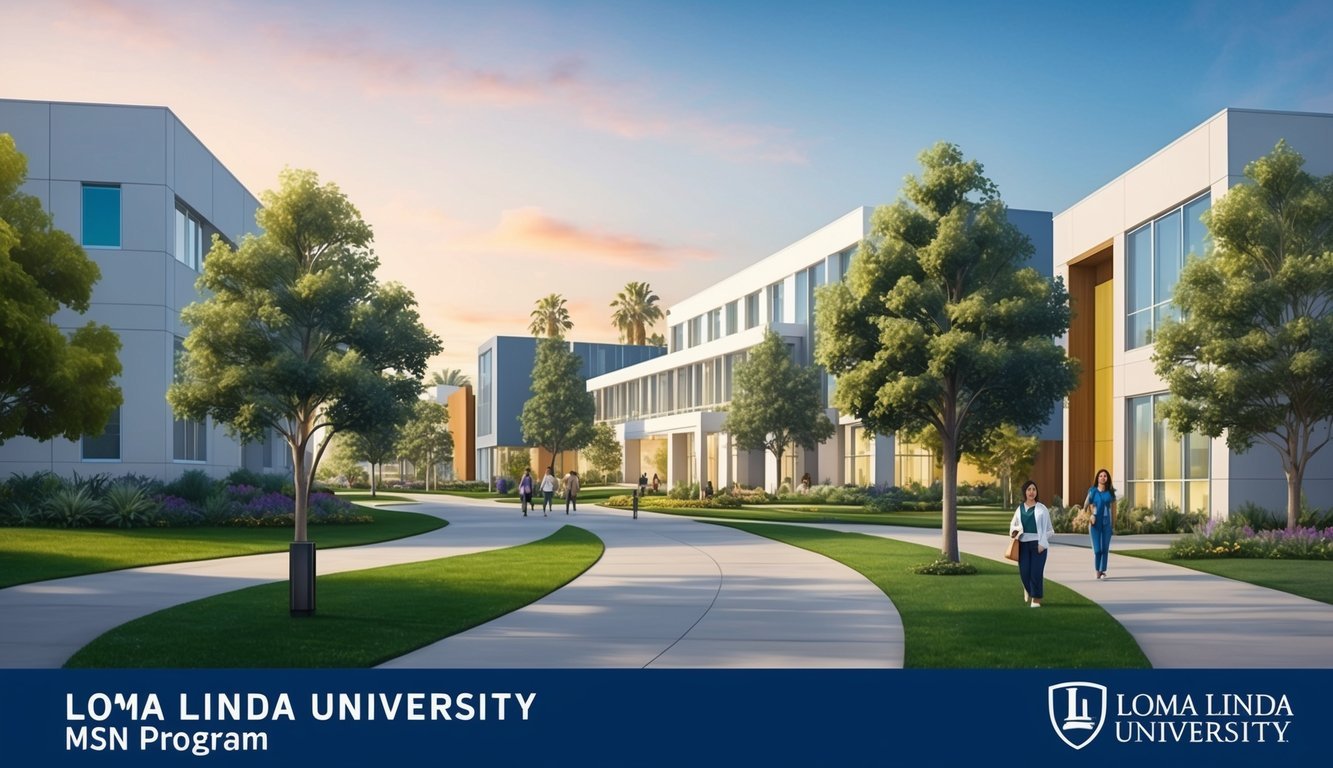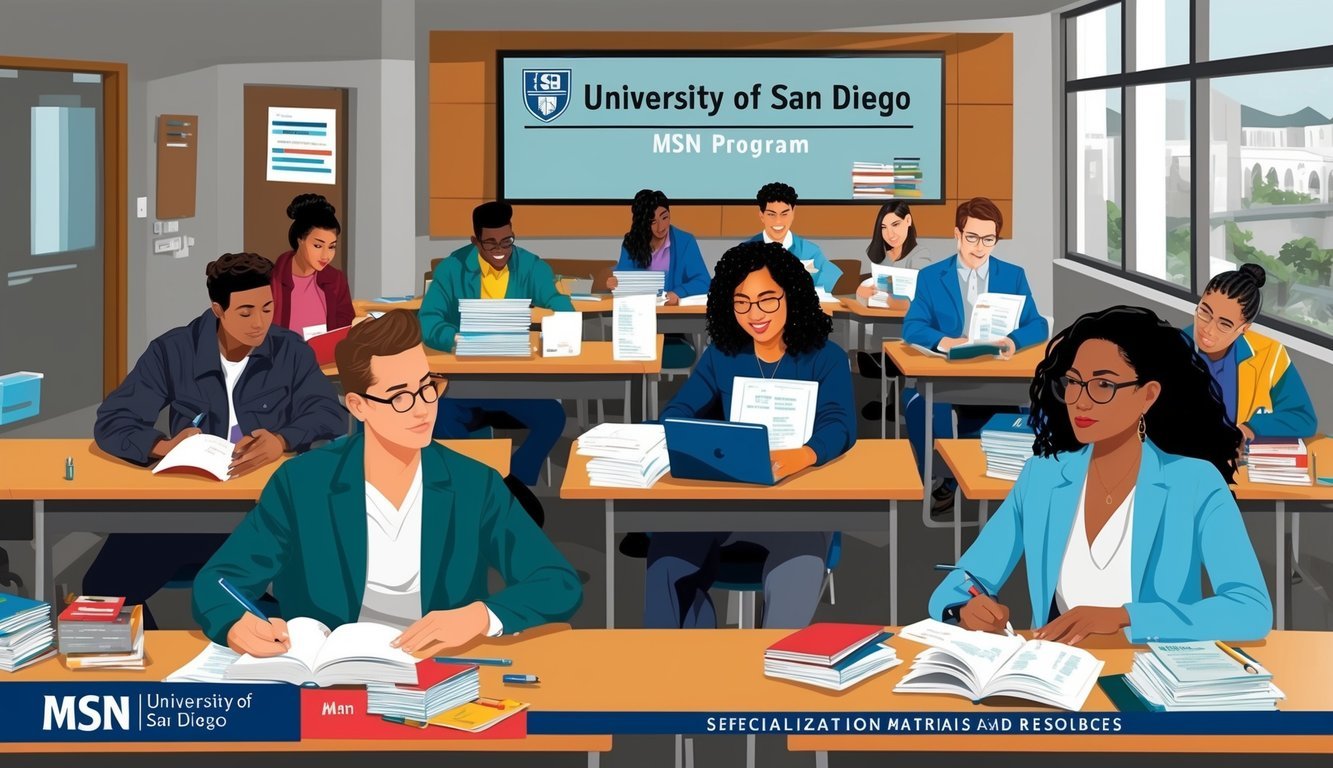Choosing the right Master of Science in Nursing (MSN) program is a crucial step in advancing your nursing career.
With numerous options available in California, understanding the best programs can help you make an informed decision. Top nursing schools in the state offer premier training that prepares you for advanced roles in healthcare.
Whether you are a seasoned RN or considering a career switch, selecting an accredited program that meets your goals is essential.
These MSN programs provide a range of specializations and practical experiences tailored to the evolving needs of the healthcare industry.
By exploring the best MSN programs in California, you can find the right fit for your educational and professional aspirations.
University of California, Los Angeles – MSN Program

The University of California, Los Angeles (UCLA) offers a respected MSN program designed for individuals with bachelor’s degrees in fields other than nursing.
This program is structured as a Master’s Entry Clinical Nursing (MECN), providing a comprehensive pathway for those seeking a nursing career.
The MECN program spans two years and includes a blend of both classroom instruction and clinical practice.
You will acquire essential skills to become a registered nurse or public health nurse.
Key features of the UCLA MSN program include:
| Feature | Details |
|---|---|
| Duration | 2 years |
| Format | Hybrid (classroom and clinical practice) |
| Specialization Available | Advanced practice nursing, public health nursing |
| Accreditation | Commission on Collegiate Nursing Education (CCNE) |
Admission to the program requires a baccalaureate degree from an accredited institution.
You must also meet specific prerequisite coursework standards.
UCLA’s School of Nursing emphasizes a strong commitment to diversity and inclusivity in healthcare.
This approach enhances learning and prepares you to meet diverse patient needs effectively.
For more details on applications and program specifics, visit the UCLA School of Nursing website.
2) University of San Francisco – MSN Program
The University of San Francisco offers a comprehensive Master of Science in Nursing (MSN) program designed for future nursing leaders.
This program emphasizes both theory and practical experience, ensuring you are well-prepared for your career.
You can choose from various pathways, including the Master’s Entry (ME) program, which is aimed at those new to nursing.
This track allows you to become licensed as a Registered Nurse in just two years.
The program combines classroom learning with immersive clinical experiences.
For registered nurses, the RN-MSN pathway is available.
This option is fully online and asynchronous, enabling you to balance your studies with work commitments.
It consists of 33 to 38 units, depending on your educational background, and includes 400 practicum hours.
USF’s MSN program is accredited by the Commission on Collegiate Nursing Education (CCNE), ensuring that it meets high standards in nursing education.
You can find more details about the program here.
San Diego State University – MSN Program
San Diego State University (SDSU) offers a Master of Science in Nursing (MSN) program that prepares you for advanced practice roles in nursing.
This program emphasizes both clinical skills and leadership abilities.
The application process consists of two parts.
First, you must complete the program application through Interfolio.
You’ll need to submit transcripts from all previous institutions attended.
SDSU offers specialized tracks to meet your career goals.
You can focus on advanced practice nursing or healthcare systems leadership.
This flexibility ensures that you can tailor your education to your interests.
The faculty at SDSU comprises experienced professionals dedicated to your success.
They offer a supportive learning environment along with access to valuable resources.
For detailed information about the MSN program, visit the SDSU School of Nursing.
Here, you can explore further details regarding curriculum, admission requirements, and financial aid options.
4) California State University, Long Beach – MSN Program

California State University, Long Beach offers a Master of Science in Nursing (MSN) program designed to prepare advanced practice nurses.
This program emphasizes evidence-based practice, leadership, and clinical skills essential for nursing roles.
The MSN program provides various concentrations, including Family Nurse Practitioner and Nurse Administrator options.
This allows you to tailor your education to fit your career goals.
You can expect a strong focus on preparation for the NCLEX and clinical competency.
The program boasts an impressive pass rate for first-time NCLEX test-takers, showcasing the quality of education.
CSULB’s nursing program is accredited by the Commission on Collegiate Nursing Education, ensuring that your degree meets high educational standards.
Engaging in hands-on experiences and clinical rotations will also enhance your learning.
To learn more about the MSN program and its application process, consider visiting the CSULB School of Nursing website.
5) University of California, Irvine – MSN Program
The University of California, Irvine offers a comprehensive Master of Science in Nursing (MSN) program designed for both aspiring and current nursing professionals.
This program prepares you for advanced practice roles with a focus on leadership and clinical skills.
You will benefit from a blend of rigorous coursework and hands-on clinical experience.
The faculty at UC Irvine includes some of the leading experts in the nursing field, providing you with valuable insights and mentorship.
The program emphasizes evidence-based practice, equipping you with the necessary skills to improve patient outcomes.
You will engage in learning that fosters critical thinking and prepares you for various healthcare settings.
Additionally, UC Irvine’s nursing program has a strong connection with local healthcare organizations, enhancing your networking opportunities.
This can be beneficial as you pursue career advancements in nursing.
For more details on the MSN program and application requirements, you can visit the UCI Nursing website.
The program is a solid choice for those looking to elevate their nursing practice in a supportive academic environment.
6) Loma Linda University – MSN Program

Loma Linda University offers a Master of Science in Nursing (MSN) program that emphasizes population health.
This program caters to non-nurse college graduates who seek an accelerated path to becoming registered nurses.
The curriculum includes essential training in evidence-based nursing care.
You will focus on areas such as care coordination, religious and cultural considerations, and the wellness-illness continuum.
Your journey begins with a significant portion of undergraduate nursing requirements.
The program structure allows you to complete the necessary clinical hours at the Loma Linda University Medical Center, enhancing your hands-on experience.
Loma Linda’s supportive learning environment is reinforced by state-of-the-art facilities.
Established in 1905, the institution has a long history of empowering nursing students through rigorous academic training.
For more in-depth details, you can explore the Loma Linda University School of Nursing.
This program positions you for success in various nursing roles in today’s healthcare landscape.
7) University of San Diego – MSN Program with Multiple Specializations

The University of San Diego offers a Master of Science in Nursing (MSN) program that features multiple tracks.
You can choose from specializations such as nurse leadership, nursing informatics, and adult-gerontology.
This program prepares you for various roles in the nursing field.
The faculty emphasizes both practical skills and theoretical knowledge, ensuring a well-rounded education.
If you pursue the nursing informatics track, you will benefit from the program’s recognition by the Health Information Management and Systems Society (HIMSS).
This enhances your eligibility for certification and positions you for a career in a growing sector.
The program’s design ensures flexibility, allowing you to tailor your education based on your career goals.
With a comprehensive curriculum and experienced faculty, the University of San Diego provides a strong foundation for aspiring nursing professionals.
For more information, visit the University of San Diego MSN Program.
You can also explore reviews and rankings for MSN programs on platforms like NursingProcess.org.
8) California State University, Fullerton – MSN Program
California State University, Fullerton (CSUF) offers a Master of Science in Nursing (MSN) program designed to prepare you for advanced practice roles in nursing.
The program emphasizes both clinical skills and leadership, essential for today’s healthcare environment.
You can choose from various concentrations, including school nursing, which focuses on promoting student health and academic success.
The School of Nursing at CSUF highlights the importance of autonomy in nursing practice.
The MSN program includes core coursework on advanced nursing concepts and research.
These classes provide a strong foundation to enhance your clinical judgement and decision-making skills.
CSUF’s curriculum is tailored to meet the needs of in-demand nursing specialties.
With a commitment to excellence, CSUF’s nursing programs are ranked among the top nationally.
The tuition structure for the master’s program includes a $70 application fee for U.S. residents.
By choosing CSUF, you gain access to valuable resources and a supportive academic community, fostering your growth as a nursing professional.
9) Azusa Pacific University – MSN Program

The Master of Science in Nursing (MSN) program at Azusa Pacific University prepares you for advanced nursing roles.
It emphasizes both theory and practical skills, providing a solid foundation for clinical practice.
This program is accredited by the Commission on Collegiate Nursing Education.
You will benefit from a curriculum designed to meet the highest educational standards.
Azusa Pacific offers various specialties, including Nurse Practitioner pathways.
These options allow you to tailor your education to align with your career goals.
With campuses in Azusa and the Inland Empire, the program is accessible to a broad range of students.
APU’s commitment to a Christian worldview also fosters a supportive learning environment.
You will engage with experienced faculty dedicated to your success.
The program combines rigorous academic training with practical experiences to enhance your learning.
For more details, visit the Azusa Pacific University MSN program page.
This resource provides comprehensive information on admission requirements, curriculum, and application procedures.
10) University of California, Davis – MSN Program
The University of California, Davis offers a comprehensive Master’s Entry Program in Nursing (MSN) that prepares you for a career in nursing.
This program is for individuals seeking to transition into the nursing field.
The MSN program has a duration of 18 months and is conducted in person.
You will earn a Master of Science in Nursing degree, which qualifies you to take the NCLEX for registered nursing.
Graduates of this program emerge as leaders in nursing, equipped to advocate for diverse patient populations and promote healthier communities.
The curriculum emphasizes practical learning and community health.
With a total of 92 credits required, the curriculum integrates clinical education with research and innovation.
This approach prepares you not just for clinical practice, but also for positions in healthcare leadership.
For more information about admission requirements and financial aid, visit the official UC Davis Nursing page and explore the specific details of the program that might align with your career goals.
Accreditation and Reputation
Accreditation is a vital aspect of any Master of Science in Nursing (MSN) program.
It ensures that the institution meets specific quality standards, which directly impacts your education and career prospects.
A program’s reputation, often influenced by its accreditation, plays a significant role in your ability to secure jobs post-graduation.
Importance of Accreditation
Accreditation serves as a mark of quality for MSN programs.
It assures you that the education provided meets industry standards and prepares you for advanced nursing roles.
Many employers prefer candidates from accredited programs because they often have better-prepared graduates.
Accreditation also affects eligibility for federal financial aid and state licensure exams, such as the NCLEX.
When evaluating MSN programs, ensure they are accredited by recognized bodies.
Graduating from an accredited program can enhance your employability and provide better opportunities for career advancement.
Non-accredited programs may limit your options and could hinder you in pursuing further education.
Recognized Accrediting Bodies
Various accrediting bodies evaluate MSN programs to ensure quality.
In the United States, two of the primary recognized organizations are:
| Accrediting Body | Focus Area |
|---|---|
| Commission on Collegiate Nursing Education (CCNE) | Nursing education programs at the bachelor’s and graduate levels. |
| Accreditation Commission for Education in Nursing (ACEN) | Covers all types of nursing programs. |
Each of these organizations follows strict criteria to assess nursing programs.
Programs holding accreditation from these bodies demonstrate a commitment to high educational standards.
When researching MSN programs, check their accreditation status with these recognized organizations.
This verification can significantly influence your choice and ultimately your career trajectory in nursing.
Curriculum and Specializations
When evaluating MSN programs, it’s essential to consider the curriculum and specialization options available.
The curriculum typically includes core components designed to deepen your nursing knowledge while specialization tracks allow you to focus on areas that align with your career goals.
Core Curriculum Components
The core curriculum in MSN programs usually encompasses key areas that enhance your clinical and leadership skills.
Typical components include:
- Advanced Health Assessment: You’ll learn to conduct comprehensive assessments and identify health issues.
- Nursing Theory: This explores various theories guiding nursing practice, ensuring a strong foundational understanding.
- Research Methods: You will study research methodologies to develop critical thinking and evidence-based practice skills.
- Healthcare Policy and Ethics: Understanding policy is crucial for navigating the healthcare landscape effectively.
These elements provide a comprehensive foundation, equipping you to take on advanced practice roles in nursing.
Popular Specialization Tracks
MSN programs offer various specialization tracks tailored to your interests and career aspirations.
Common specialties include:
- Family Nurse Practitioner (FNP): Focuses on providing holistic care across all ages.
- Nurse Educator: Prepares you to teach in academic and clinical settings.
- Clinical Nurse Specialist (CNS): Centers on improving patient outcomes through expert practice in specific areas.
These tracks enable you to align your education with your career objectives.
They ensure you gain relevant skills for your desired role in healthcare.
For detailed options in specific programs, explore resources like the 30 Best MSN Programs in California.

